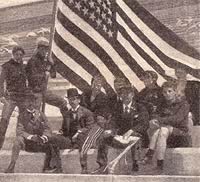|
|
|
|
|
|
|
|
|
|
|
|
|
|
|
|
|
|
|
|
|

This is a first
person account of the first Olympic Games, held in the spring of 1896
in Athens, Greece. Written by Ellery Clark, this article was first published
on March 9, 1911.
| Part One - The First Olympic Team |
| Part Two - The Opening of the First Olympic Games |
Part Three - The First Olympic Champion
In the meantime Lane of Princeton and Burke of Boston had won their heats in the hundred meters, and the next event, the hop, step and jump, was under way. Here the whole event was run off at once, so that this was really the first Olympic championship to be decided.
James B. Connolly was the only American entry, and we watched some dozen of the other contestants make their trials before, at last, Connolly's name was called. We, of course, knew what he could do. He held at that time, and for many years afterward, the American record for the two hops and a jump. We were therefore more pleased than surprised when he hit his take-off perfectly, and landed out in the pit, almost six feet beyond his nearest competitor.
The Greeks were astounded, and after that jump Connolly's popularity in Athens was assured. As he walked back to the dressing-rooms, winner of the first championship, the crowd surged round him, shouting his name, and coupling it with cries of "Nike! Nike!"
Then came the trials in the four hundred meters. Burke and Jamison won their heats, and in the eight hundred meters Flack of Australia and Lermusiaux of France were the winners.
Last of all came the discus-throw, and here Garrett of Princeton surprised every one by managing, upon his last trial, to win, by the narrow margin of inches, from the best performer among the Greeks.
 THE BOSTON ATHLETIC ASSOCIATION TEAM |
On the second day of the games Burke won the final heat of the four hundred meters, with Jamison second, Garrett won in the shot, Curtis of America and Golding of England won the trials in the hundred-and-ten-meter-hurdle-race. Flack, the Australian, won the mile by a close margin over Blake, our entry, and I won the broad jump.
My own win was about as close a thing as could well have been. In America the invariable custom is for the jumper to measure off his run, and to mark the spot where he begins to run his hardest with something that will readily catch the eye. I myself was very dependent upon this mark, and practically lost without it. In addition, the jumping path was rough, utterly unlike the closely rolled cinders to which I had been accustomed, and this might well mean a difference of a foot or more in allowing for a proper run.
Thus my discomforture was great when Prince George of Greece, who was superintending the event, emphatically forbade any measurements or marks. Apparently this, to his mind, savored of "professionalism." We made a faint attempt to argue, were promptly suppressed, and remembering the cautions we had received at home, lest possible international bad feeling should arise out of the games, we meekly bowed to the decision.
Connolly and Garrett both got in fair jumps, but when my turn came I hit the take-off wrong, stepped over the board, and of course heard my jump condemned as a foul. On my second trial I figured as closely as I could, tried to reason where I had missed it before - and fouled again. I shall never forget my feelings as I stood at the end of the path for my third and last try.
Five thousand miles, I reflected, I had come, and it was to end in this? Three fouls, and then five thousand miles back again, with that my memory of the games. I figured once more, got into my stride as well as I could, jumped - and won. But there were a few moments before that third trial that I have no wish to repeat.
On April 8th and 9th the gymnastic contests were held, and in these the Greeks and the Germans showed to the best advantage. The only athletic event upon the 9th was the final of the eight hundred meters, in which Flack was an easy winner.
Friday, April 10th, was the last day of the games, and the one beside which all others sank into insignificance. The program included the final heat of the hundred-meter run, the hurdle race, the pole vault, the high jump, and by far the most important to the general public, the Marathon. The Greeks seemed to feel that the national honor was at stake, the excitement was so great as to be almost painful, and on all sides we heard the cry, "The other events to the Americans; the Marathon to a Greek!"
Part
Four- "The First Marathon"
Ellery Harding Clark A.B., LL.B. (Harvard). Lawyer; formerly a member of the Boston school board and of the Boston board of aldermen. For four years a member of the Harvard track team; represented the United States at the Olympic Games at Athens, 1896, winning high and broad jumps; all-round athletic champion of New England, 1896, 1897, 1909; all-round athletic champion of America, 1897, 1903; author of law treatises, novels and books on athletics.
RP
News | Articles | Trivia
| Profiles | Vintage
Video | Vintage Photos | Contact
Us | Site Map | Home
Cards | Posters
| Autographs | Books
| Pins | Prints
| Authentics | Sportscasters
| How to Order
©
Running Past LLC All Rights Reserved mail@runningpast.com

